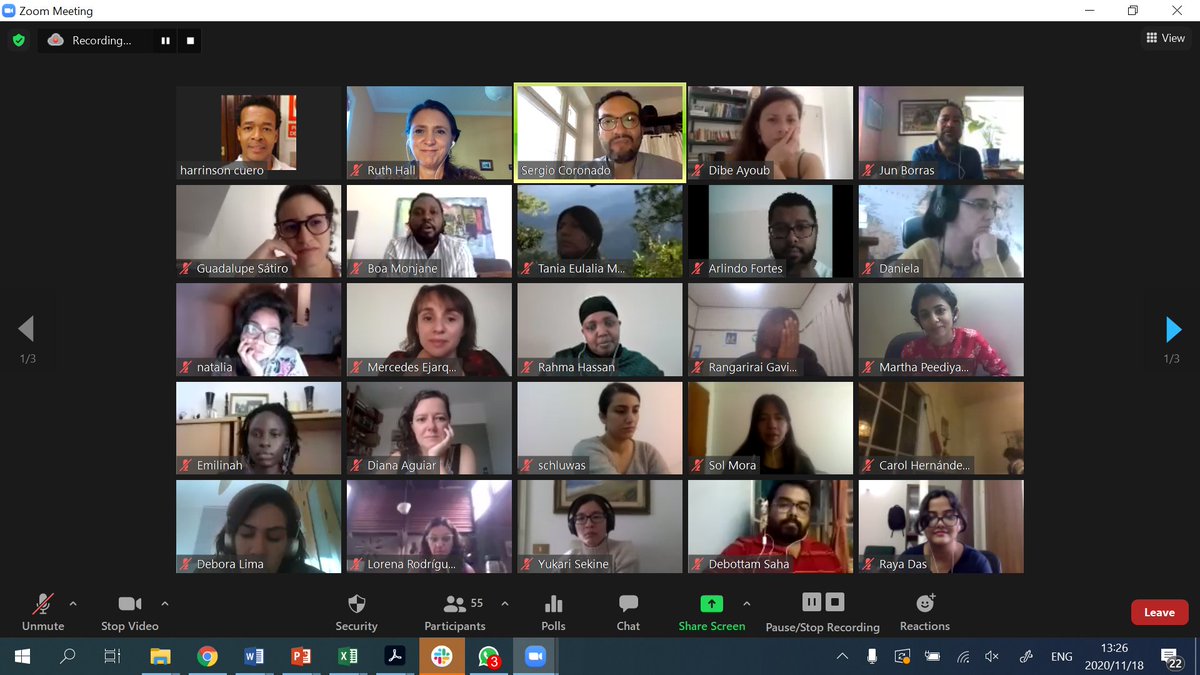
#LandGovernance: Today is DAY 1 of the Political Economy of Land Governance in Africa short course.
The class of 2021 comprises 88 land professionals from 29 African countries.
Thread 👇
Read more: bit.ly/2V5iLZB
@NELGA_AU @PLAASuwc @UWConline @ECA_OFFICIAL @giz_gmbh
The class of 2021 comprises 88 land professionals from 29 African countries.
Thread 👇
Read more: bit.ly/2V5iLZB
@NELGA_AU @PLAASuwc @UWConline @ECA_OFFICIAL @giz_gmbh
Colonial conceptions of customary tenure continue to inform conceptions of the customary today. The "customary" is not fixed from some time immemorial; it has been reshaped for ideological & political purposes.
Prof. Kojo Amanor, African Studies, Ghana
@UnivofGh @IASUG
Prof. Kojo Amanor, African Studies, Ghana
@UnivofGh @IASUG

@UnivofGh @IASUG It's thrilling to get to know the land officials, activists, professionals and academics from across the continent.... The next generation of African land expertise.
The Political Economy of #LandGovernance in Africa short course - now online.
The Political Economy of #LandGovernance in Africa short course - now online.

This course is aimed to strengthen capacity and critical analysis among land professionals in Africa - in government, civil society, private sector and academia. And to prioritise women in the #LandGovernance space. 

Following the late Prof Samir Amin, we discuss how diverse histories of colonisation produced distinct legacies that still endure:
Africa of trade economies in West Africa
Africa of concession companies in Central Africa
Africa of labour reserves in East & Southern Africa.
Africa of trade economies in West Africa
Africa of concession companies in Central Africa
Africa of labour reserves in East & Southern Africa.
The majority of African landholdings lie outside of statutory tenure – and the types of property relations prescribed by the state. Across the regions, customary tenure is often not secured in law or practice - and often derided and backward by 'modernisers', according to Amanor.
Introducing a "political economy" approach: #LandGovernance is not a mere set of technical tools to allocate, administer land. We have to ask who owns what, who does what, who gets what - and what they do with it. In other words: whether it reshapes power & class relations. 

We are debating Prof Archie Mafeje's view that there's a land question in “settler Africa” where land dispossession took place at scale. But the rest of the continent doesn’t have a “land question” – rather has an “agrarian question”.
Prof Sam Moyo pointed out that the new scramble for Africa's land means that now there is dispossession and privatisation at scale across regions that never had settler colonies. Are Africa's land questions converging? We are debating at #LandGovernance course. 

Some African states have tried to return land to the dispossessed and their descendants. But this has been slow, complex, conflictual. There's a tension between restitution and providing equitable access to people *now*. Restoring the commons is an alternative to (re)privatising.
Now Dr Phillan Zamchiya of @PLAASuwc gives a powerful overview of land reform laws and policies in Southern Africa. He shows how the policy agenda has been hijacked and shifted towards elites. A fascinating rundown of Mozambique, Namibia, Zimbabwe & SA at #LandGovernance course. 

Criminalisation of social movements stands in the way of democratising #LandGovernance in Africa. This from some of the participants in group discussions. @via_campesina 

Market-based land reforms have been biased against the poor, against women and against indigenous groups - and also has been slow and expensive. This from some of the participants in group discussions @ #LandGovernance in Africa course.
Land inequality is rising in Southern Africa. #LandGovernance policy measures don't counteract this. What would land reforms to promote #equitableaccess to land look like? Some basic entitlement to land, plus secure rights for those with informal and customary tenure. Debating...
Day 2 of The Political Economy of Land Governance in Africa short course kicks off with a dazzling tour of land laws & policies in West Africa, North Africa and East Africa.
First off: the fabulous Prof. Mamadou Goïta @irpadafrica in Bamako, Mali #LandGovernance @NELGA_AU @giz
First off: the fabulous Prof. Mamadou Goïta @irpadafrica in Bamako, Mali #LandGovernance @NELGA_AU @giz

More than 95% of rural producers in West Africa have no official land rights. Yet there are laws that recognise customary tenure - except in Senegal. The real challenge is democratic & decentralised #LandGovernance, says Prof Goïta
@NELGA_AU @PLAASuwc @giz_gmbh
@NELGA_AU @PLAASuwc @giz_gmbh
Prof. Mamadou Goïta from Mali discusses the new wave of land reforms being pushed in West Africa: at stake is democratisation versus alienation of land.
He is a leading scholar on #landrights and smallholder farming in Africa, has been on @FAO high-level panel of experts.
He is a leading scholar on #landrights and smallholder farming in Africa, has been on @FAO high-level panel of experts.

What's to be done?
•Decentralised & democratic #LandGovernance
•Recognition of customary rights as property
•Accessible transparent land admin
•Positive discrimination for women & youth
•Regulate land markets
•Participatory processes of drafting policies
- Prof Goïta
•Decentralised & democratic #LandGovernance
•Recognition of customary rights as property
•Accessible transparent land admin
•Positive discrimination for women & youth
•Regulate land markets
•Participatory processes of drafting policies
- Prof Goïta
Confused about customary #LandRights? And how to reconcile with #womenslandrights?
Prof Mamadou Goïta @irpadafrica sums it up:
"The answer to discrimination in customary law is to transform custom – not to abandon it."
#LandGovernance course @NELGA_AU
Prof Mamadou Goïta @irpadafrica sums it up:
"The answer to discrimination in customary law is to transform custom – not to abandon it."
#LandGovernance course @NELGA_AU
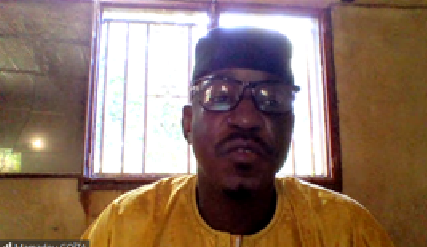
@irpadafrica @NELGA_AU "Land registration is a colonial tool." 9 of 15 countries in West Africa inherited this from France, yet France has land transaction records, not ‘land registration’. Why? Registration obliterates the claims of people other than those whose names appear. Prof Mamadou Goïta
Now we move onto North Africa and #LandGovernance in Egypt, Tunisia and elsewhere, with Prof. @yasminemoataz.
(We are going in a clockwise fashion from Southern to West to North to East Africa at this @NELGA_AU short course hosted by @PLAASuwc @UWConline)
(We are going in a clockwise fashion from Southern to West to North to East Africa at this @NELGA_AU short course hosted by @PLAASuwc @UWConline)

Egypt's story of modest/failed redistribution rings a bell at the other end of the continent. It also shows land concentration, continued dispossession & a nationalist struggle that gives way to alliances between national political elites with (domestic & international) capital.
All this takes us back to yesterday's conversation about how 'land governance' is not separate from agrarian politics and wider political economy and development path. Governing land is to make decisions about power and accumulation pathways in society.
An observation: following different histories of colonisation and independence in Africa, and even early independence policies, recent trends are quite uniformly towards liberalising #LandGovernance in line with wider economic reforms to facilitate privatisation and investment.
East Africa is our next focus in the #LandGovernance course - and convening this session is the dynamic @EileenWakesho of @NamatiKenya @GlobalNamati who is co-chair of the Scientific Committee of the Conference on Land Policy in Africa - and also an alumna of this course! 

Professor Patricia Kameri-Mbote, the first woman to receive a 'higher doctorate' from the University of Nairobi @uonbi and eminent land lawyer and legal scholar presents a dazzling review of #LandGovernance land reforms and policies in East Africa at our @NELGA_AU course. 

“Whatever land tenure you have, the state is the granter and guarantor of land rights” - Prof. Kameri-Mbote points out the range of challenges, and how statutory & customary systems relate to one another, at the #LandGovernance course @NELGA_AU with @PLAASuwc 

Lessons from East African #landreforms: land titling dispossesses secondary rights holders (women, migrants, youth and tenants). But ownership of land, water, forests, wildlife is vested in the state, citizens often does too. The problem isn't state versus market. It's both.
“Land reform tends to be extremely political, because the decisions that need to be taken will affect the powerful.” - Prof. Kameri-Mbote on the experiences of countries in East Africa #LandGovernance @NELGA_AU @giz_gmbh @PLAASuwc @UWConline 

DAY 3 of the #LandGovernance in Africa course starts with women's land rights, and chairing this session is our very own @sthaYeni PhD candidate and multitalented intellectual and scholar-activist. 

@lyn_ossome critiques liberal legal formulations and assumptions about *why* women need land rights. There are competing narratives about #womenslandrights: as a marketable commodity w/i a neoliberal paradigm or an entitlement and a basis for social reproduction. @IEJ_SA 

Is customary law this archiaic thing that should be thrown out? No. There are many ways of thinking about women’s land rights within this frame – but requires decolonising assumptions about power and authority within custom. That's the argument emerging in this conversation.
It's incorrect to assume that customary #landrights are insecure & an impediment to productive use. As Prof Kenneth Okoth-Ogendo showed, customary tenure is robust and secure; this contradicts the assumptions of both colonial and also postcolonial state thinking. #LandGovernance
Thinking about women’s land rights in global south today requires attention to the function of land within social reproduction. Not just land as a commodity or production for markets. But for survival for people whose livelihoods are rendered precarious - argues @lyn_ossome
Land is an entry point to livelihoods in forests, fisheries (lakes, rivers, oceans) & food. #LandGovernance must be approached holistically. Yet we see enclosure of other natural resources, not only land. Prof Moenieba Isaacs @PLAASuwc is next up on natural resource management. 

Indigenous people continue to face threats to their territory. In many parts of Africa, as elsewhere, there are struggles between competing land uses & users. - Prof Isaacs #LandGovernance 

The ‘blue economy’ agenda that big philanthropies, companies & donors promote is about ecological protection without social protection – converting natural resources into capital and undermining the livelihoods of people who rely on the oceans & lakes for fishing - Prof Isaacs 

"Blue Justice" is an alternative to "Blue Economy". Instead of commodifying oceans, lakes, rivers and the life within them, secure just and sustainable access for people's livelihoods. This is Prof. Moenieba Isaacs's argument #blueeconomy #bluejustice @MasifundiseDT @WorldFishers 

As natural resources are commodified in the name of sustainability, the traditional livelihoods of people who rely on oceans & forests are criminalised. At the same time, ecologically-destruction concessions to multinationals for oil & gas exploration are underway across Africa.
Now onto 'extractive industries' and especially mining, which is a key driver of #landgrabs in Africa, with Dr Hibist Kassa of @hibist @IfaaCT
“People are treated in the same way the colonial state treated them”, as they face removal to make way for mining.
“People are treated in the same way the colonial state treated them”, as they face removal to make way for mining.

With the example of the Ashanti protectorate, Dr @hibist shows how control over minerals has driven land dispossession over time. Large-scale mining has been systematically privileged while artisanal mining has been criminalised, not only under colonial rule but since then too. 
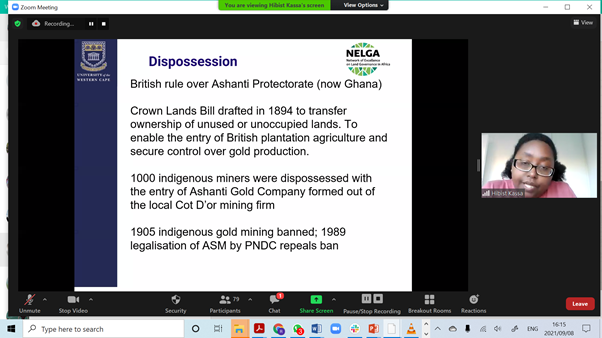
@siviwemdoda07 pins it down: the system of paying mining royalties to traditional authorities means that corruption is endemic and negative towards ordinary people - at @hibist lecture at #LandGovernance @NELGA_AU course. @Tshisimani 

@hibist takes us through varied African law reforms to deal with the iniquitous dispossession of customary land owners to make way for large-scale mining - a pattern that has endured and is perpetuated by many African states. #LandGovernance 

DAY 4 gets off to a start, with @EileenWakesho introducing our eminent speaker, the pan-Africanist agrarian Marxist guru, Prof @IssaShivji. This #LandGovernance course is building to a climax.... @NELGA_AU @giz @PLAASuwc 

Hold onto your hats, here comes Prof. @IssaShivji to give us a triple lecture on the concepts of the commons versus ownership of land, the neoliberalisation of the commons in Africa and the reclaiming of the commons - at the #LandGovernance course @NELGA_AU @iasc_commons 

Land is not naturally property. To become property, land has to be fixed & demarcated into units. This happens historically. But how is it obtained in the first place? Through primitive accumulation (theft) - @IssaShivji takes us thro the creation of property in colonial Africa 

In colonial Tanganyika the 1923 Land Ordinance declared all land to be public land at disposal of the governor. With ultimate title vested in the state, it was the governor who could allocate land. "In one fell swoop, the British took over all land in Tanganyika." - @IssaShivji
This is the colonial model: vest property in the state, and the state mediates ‘granted’ rights of occupancy to companies and settlers, and ‘deemed’ customary rights of occupancy for natives. By centralising ownership in the state, land grabbing was legalised. @IssaShivji 
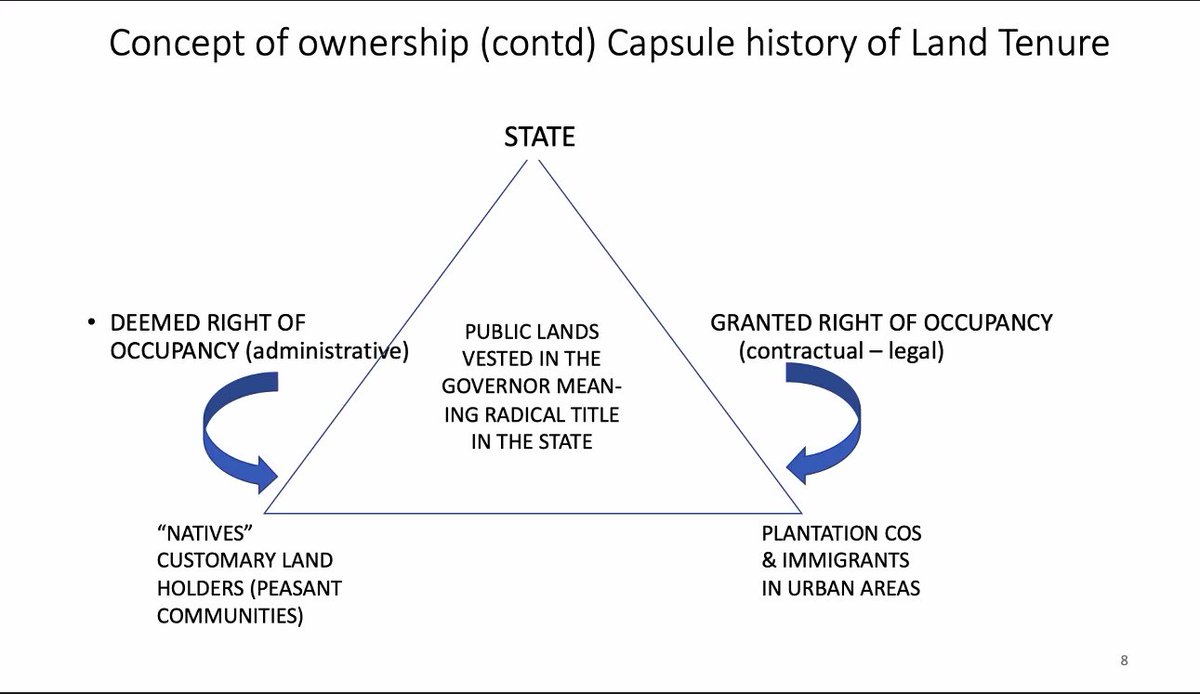
@IssaShivji: There are 3 elements of land commodification: individualisation, titling & registration (ITR). Kenya did this to create a class of 'yeoman' farmers. ITR was postponed in Tanganyika – not defeated. It came back under neoliberalism in Tanzania (@HDeSotoPeru influence)
"Colonialism was an onslaught on the commons." - @IssaShivji
Now, “communal ownership” is a widely-used concept – but it's a misunderstanding of the commons. Commons is not ownership. Communal ownership is still primitive acccumulation. Community titling still commodifies land.
Now, “communal ownership” is a widely-used concept – but it's a misunderstanding of the commons. Commons is not ownership. Communal ownership is still primitive acccumulation. Community titling still commodifies land.
@IssaShivji points out: whether capitalist (Kenya) or socialist (Tanzania), early post-colonial states enabled accumulation by raising wages, import-substitution, subsidised food & farm inputs & public education, health, finance, energy, water. This was African developmentalism. 

Since structural adjustment in the 1980s, we've seen the *neoliberalisation* of the commons. The elements of these are: privatisation, commodification and marketisation of public goods - including land but also: subsidies, public educaiton, health, water, finance. - @IssaShivji
@IssaShivji sets out an agenda for reclaiming the African commons: shift from ‘ownership’ to land control, regulation, management; shift from food as cash crop to food sovereignty and self-sufficiency, to reconstruct the national economy – rather than a neo-colonial economy) 

"Our governments are not free to govern. We might have got rid of formal colonialism but we are still under imperialism. Nkrumah taught us about neocolonialism. Now we have neoliberalism. Our struggle has to be both anti-imperialist & anti-capitalist." @IssaShivji #LandGovernance 

"There's a strong pan-Africanist sentiment especially among youth. Struggle has to be anti-imperialist, pan-Africanist solidarity - not of states, or ruling elites, but of the working people. We are here to revisit and rebuild pan-African solidarity." - @IssaShivji
@IssaShivji's caution to the youth: “don’t get lost in the dominant discourse and ideologies. Create parallel ways of educating yourselves... And fight for the formal institutions to change their approaches. Challenge them. That’s how you build counter-hegemonic ideas." 

Restoring the African commons means #foodsovereignty. What should be done? Treat food as a public good - not merely a commodity. Regulate food prices. Governments should buy when food is produced in excess; store it; release during shortages to prevent price spikes. - @IssaShivji 

Next up is @abdutoit director of @PLAASuwc on rural & urban land administration, with a critique of technicist approaches to governing land and exposing the "hidden politics" of land admin. As he points out, "To govern the land is to govern the people on the land" #LandGovernance 

Land administration ideas & practices reveal governmentality, "the mentality of governing" in which government is primarily about the control of populations to ensure they are docile, healthy, productive and functional to the needs of capitalism - @abdutoit drawing on Foucault. 

Explosion in cartography & cadastral mapping went along with colonialism and capitalist development. To produce commodified property, cadastral mapping is parcel-based: a polygon with defined borders – property that can be owned, sold, borrowed against. @abdutoit #Fanon 

A paradigm shift? Instead of focus on the content of land rights, create institutional systems to give the same kinds of protection to informal land rights that are given to registered property rights holders. #Landadministration rather than (as well as?) #TenureReform @abdutoit 

Fixing #LandGovernance in Africa requires dealing with #LandAdministration from the bottom-up - but there's a conundrum. Crowdsourcing systems of land registration and digitalisation can also lead to commoditisation and financialisation - and therefore to dispossession. @abdutoit 

Now onto the hot topic of #landgrabs: the new scramble for Africa or "large-scale land-based investments". Are "win-win" solutions possible? Or alternative is to stop big land deals and invest in the existing landholders? Here to guide us through is @adwoa_gyapong #LandGovernance 

Our lecturer on land deals in Africa is @esulle46 of @PLAASuwc whose work looks at continent-wide trends, national political economy in Tanzania and elsewhere, #greengrabs of #conservation, #pastoralism and African & global #landpolicy guidelines. 

Drawing on research on development corridors, @esulle46 is showing how large-scale land deals in Africa are producing dispossession and displacement of rural populations - at the @PLAASuwc #LandGovernance @NELGA_AU course. @FutureAgrics @DFID_UK @OpenSociety 

Advocates of large-scale land-based investments argue these can benefit local people if they are designed as 'inclusive business models'. What is such a model? @esulle46 critically picks this apart, using his PhD research on sugarcane outgrowers in Tanzania @IllovoSugarGrp 

DAY 4 of the Political Economy of #LandGovernance in Africa course kicks off with @sthaYeni PhD candidate at @PLAASuwc, Atlantic Fellow @AfreGlobal introducing the topic of the African agenda on land & global guidelines @ECA_OFFICIAL @AfDB_Group @NELGA_AU @_AfricanUnion 

Why the need for an African agenda on land? - Eileen Wakesho Mwagae of @NamatiKenya takes us through the long-term problems of dispossession, insecurity, concentration - and pervasive gender inequality, on the final day of #LandGovernance @NELGA_AU @EileenWakesho @GlobalNamati 

A new scramble for African land? That's what we are discussing at #LandGovernance course. And whether the @_AfricanUnion @AfDB_Group @ECA_OFFICIAL response with an African agenda on land is sufficient to respond. Do people know about the 'African agenda on land'? 

All African governments have signed up to @_AfricanUnion declarations, guidelines & agreements about defending customary & informal land rights, providing secure tenure, democratising #LandGovernance & promoting #womenslandrights. @EileenWakesho takes us thro' these. 

At the global level too, all our governments have committed to the @FAO "Voluntary Guidelines" on governance of land, fisheries & forests - to defend people's rights against dispossession, promote redistribution & restitution. Again: good principles but where are the "teeth"?! 
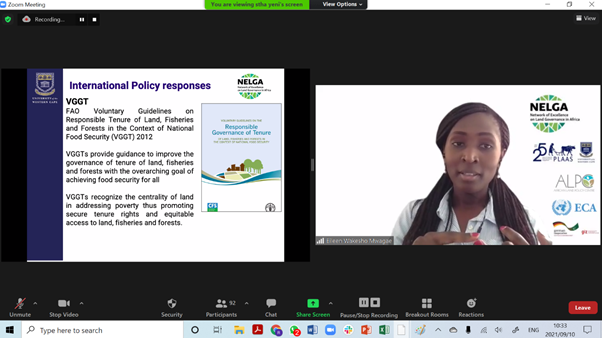
Governments have typically been following, rather than leading, initiatives to address land rights in Africa. Leading the charge are civil society orgs mobilising within & across countries - like the women's Kilimanjaro initiative, "Behind the Brands", etc @LM_Africa @Oxfam 

Participants ask: amid a proliferation of intergovernmental agreements on #LandGovernance, what about monitoring what governments actually *do*? How can African civil society & social movements be central in evaluating governments’ adherence with the African agenda on land? 

Climate change affects access & rights to African land & natural resources - and in turn #LandGovernance must confront climate change. But this isn't a technical matter; it's political. Dr James Murombedzi @AfricanClimate @ECA_OFFICIAL takes us on a deep dive into #ClimateCrisis. 

Globally, a quarter of #greenhouse gas emissions are from energy generation (especially fossil fuels) and a quarter from agriculture, forestry & other land uses (especially land use changes like the 'opening up' of forests & grasslands for crop farming, livestock production). 

Poverty is the biggest driver of vulnerability to #climatechange in Africa, yet the continent contributes the least #greenhouse gas – only 4% of the global GHG, says James Murombedzi of @ECA_OFFICIAL @AfricanClimate.
It’s an iniquitous situation: least to blame, most at risk.
It’s an iniquitous situation: least to blame, most at risk.
A response to #ClimateCrisis has been the creation of carbon credits & payments for #Ecosystem services, based on the idea that destructive land uses are a ‘market failure’ and can be solved through the market. Still, it means that we are commodifying land and natural resources. 

Payments for ecosystem services can produce perverse results, eg. clear-cutting indigenous forests to make way for oil palm plantations as #REDD offsets. Which lead to (a) increased GHG emissions and (b) cash payments to elites/govts r/t local communities. Thoughts?
Responses to Dr Murombedzi: like all systems of compensation, we should ask searching questions about payments for ecosystems services: principled questions (is it a just model?), determination questions (how is it calculated) and distribution questions (who gets what).
What about compensation from industrialised nations? #ClimateCrisis has its roots in the industrial revolution approx 1750. Those countries should pay for mitigation & adaptation - agreed in princpie but only paltry sums paid for “common but differentiated responsibilities”.
And now onto our final session: the 88 @NELGA_AU participants have collaborated to prepare 7 presentations of what they've learnt & key messages on how to fix #LandGovernance in Africa, focusing on defending the #commons & building alternatives to industrial agriculture & mining
What African countries have in common is a struggle to recognise unregistered & informal rights - without commodifying common property. Democratising #landadministration is key, as @maps_pulliet from #Lesotho points out. @LaurenARoyston @DonnaHornby @bencous67245641 

@MaryMachari of @NLC_Kenya gives an impassioned presentation on behalf of "Julius Nyerere" group, giving critical perspectives on the formalisation of customary land and the need to defend and advance women's rights and the commons in a context of #climatecrisis 

There's a direct connection between #LandGovernance and #foodsovereignty - people need control of land as a precondition for localising & democratising #foodsystems. Prof Mamadou Goïta gives encouraging feedback on rebuilding #Africanfoodsystems after #Covid_19 crisis. @IDRC_CRDI 

The effervescent emeritus professor @IssaShivji on our panel of experts passes the baton to this generation of Africans to fix the failures of the past and be brave to challenge the orthodoxies of #neoliberalism. African expertise can fix #LandGovernance. @ECA_OFFICIAL 
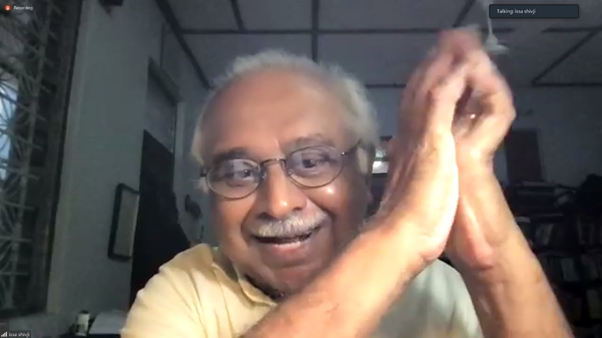
Out of nearly 600 applicants, 88 people were selected to participate in this course - from 29 African countries. Such rich diversity of experiences from government officials, activists, private sector professionals and academics. Lively discussions on #LandGovernance.... 
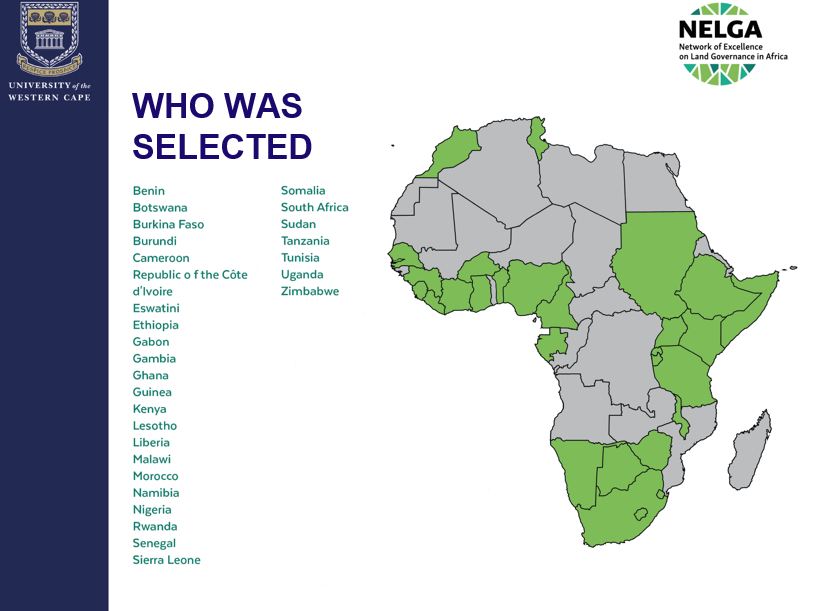
Gratitude and shoutouts to our incredible 15 lecturers from 9 African countries... centuries of cumulative learning & experience right here 👇
@hibist @esulle46 @IssaShivji @lyn_ossome @yasminemoataz @EileenWakesho @abdutoit @boamonjane @NELGA_AU @ECA_OFFICIAL @giz_gmbh
@hibist @esulle46 @IssaShivji @lyn_ossome @yasminemoataz @EileenWakesho @abdutoit @boamonjane @NELGA_AU @ECA_OFFICIAL @giz_gmbh

And gratitude & shoutouts to the young African scholar-activists who drove these discussions at #LandGovernance - @adwoa_gyapong @sthaYeni Augustine Fosu, Fadzai Chipato, Mnqobi Ngubane @EileenWakesho Doreen Kobusingye. Inspirational.
@ECA_OFFICIAL @giz_gmbh @UWConline
@ECA_OFFICIAL @giz_gmbh @UWConline

That's a wrap of The Political Economy of #LandGovernance in Africa - the @NELGA_AU short course we run each year, and now for the first time online. Best DJ added African tunes throughout - thanks Emmanuel Ogbuabo of @PLAASuwc 🎵 

• • •
Missing some Tweet in this thread? You can try to
force a refresh





